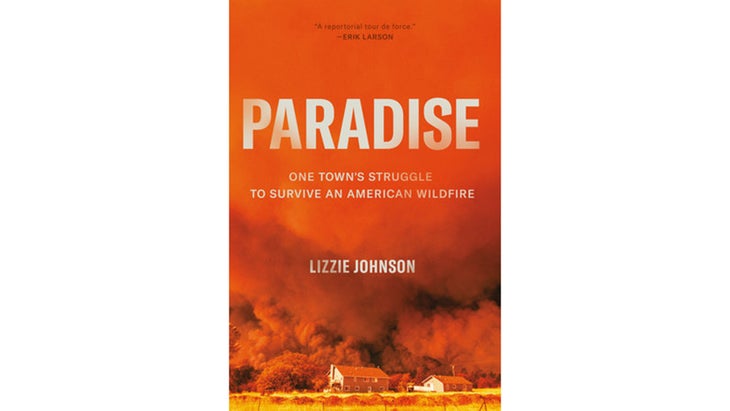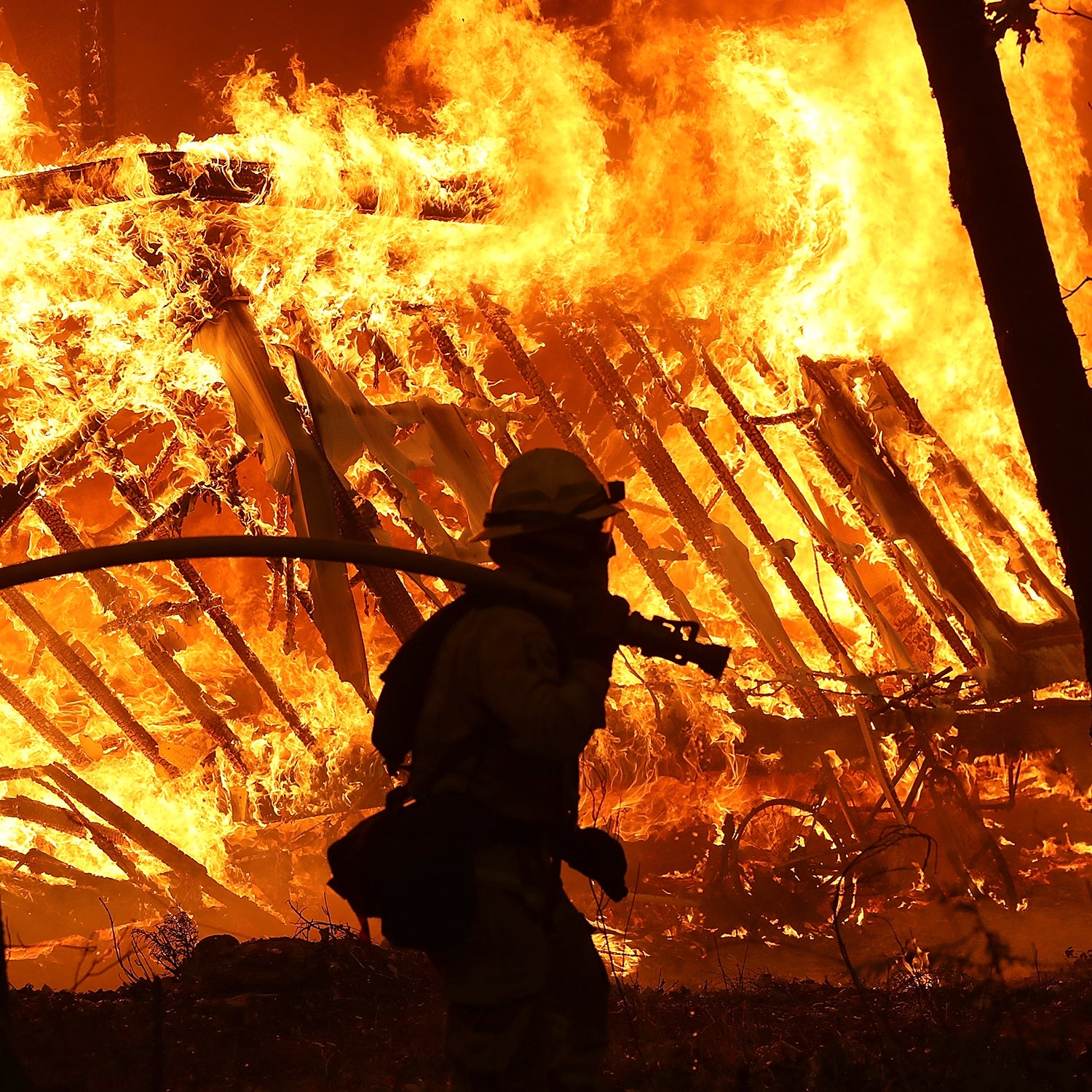I was thousands of miles away from home when the Camp Fire ignited not far from where I grew up. It was November 8, 2018, and one month since I had moved to Berlin, where the day was cold and darkening. But back home in Butte County, California, it was hot and windy. At 6:45 A.M.,ä»the fear that permeates in that corner of the world was realized: a spark lit, and a blaze was born.
Iãd spent my whole life in Northern California, where summers always carried the existential threat of wildfire. Iãd seen a few pass through Butte Creek Canyon, where I grew up, slowly burning the ridges for weeks before simmering to a stop. But in recent years, climate changeãand in this case, negligence on the part of Pacific Gas and Electric (PG&E), which supplies the majority of the state with powerãhas been creating conditions that weãve come to consider a ãnew normalã: wildfires that burn hotter, bigger, faster, later in the year, and less predictably than ever before.
On November 8, PG&E was supposed to shut off the power in Butte County, but it didnãt. A transmission tower failed in the Feather River Canyon, and within an hour, the ensuing flames were headed straight for the tiny town of Paradise, which sat on the ridge above the canyon where I grew up. Back in Berlin, I opened my laptop to gauge the threat on my home and watched the chaos unfold. I read accounts of peopleãs cars burning on the Skywayãone of the only roads out of Paradiseãas traffic snarled their escape. I saw videos of fire lining the roads, civilians fleeing on foot. I heard about people trapped in their homes and those who didnãt make it out before their cars ignited. Not long after, the fire swept down into the canyon.
It was days before I knew that my sisterãs home in Butte Creek Canyon had burned down, along with the majority of homes in that area, and that my childhood home had miraculously survived. It took weeks before anyone knew the total tally of the devastation in Butte County, but as November 8 drew to a close, 85 people were dead, 18,804 structures were destroyed, and Paradise had been wiped off the map. The Camp Fire would soon be known as the most destructive wildfire in California history.
News teams streamed into Butte County for months after the blaze, telling and retelling the gut-wrenching tales of those who survived and those who didnãt. But watching from so far away, I felt like I didnãt understand it, like I couldnãt get a full picture of what happened that day. What I did know was haunting, but what I didnãt haunted me. Until I read former San Francisco Chronicleä»reporter Lizzie Johnsonãs new book
Paradise, out this month, is a harrowing minute-by-minute account of the Camp Fire, combining on-the-ground stories from the townãs residents, first responders, and officials, with a complete picture of the environmental conditions, urban-planning missteps, corporate negligence, and bureaucratic failures that coalesced into this unprecedented disaster. By the end, I closed its pages with the paradoxical realization that the devastation this fire wrought was completely avoidable, but also that weãre doomed to see it repeated over and over againãand already are.

The book opens at dawn at fire station 36 in the Feather River Canyon, where California Department of Forestry and Fire Protection (Cal Fire) captain Matt McKenzie wakes to the sound of ãponderosa pine needles [falling] like the raindrops that refused to come.ã An hour later, heãs forced to abandon the breakfast heãs preparing for his crew, when news of a nearby fire pings his phone. From there we watch in slow motion as the fire explodes, traveling an acre a second and cascading through the tiny community of Concowãwhere residents only knew of the fire when flames licked their homesãbefore bearing down on Paradise.
Johnson takes us through the chaos as emergency responders try to calculate the speed and threat of the fire, which moved faster than anyone could wrap their heads around. City officials stall evacuation orders, not fully comprehending the magnitude of the impending disaster. We see how vulnerable Paradise was: because the town is located atop a ridge with just a few routes out, evacuating all of theä»nearly 27,000 residents at once was impossible.
In the end, it didnãt really matter how they timed the ordersãdue to a technological error and a low registration rate, the emergency alert system failed to send an evacuation notice to 80 percent of Paradiseãs residents before it was too late. As the flames neared the town, smoke turned the sky a ãbruised navy, then blackã before a ãhail of embersã like ãmillions of lit matches flutter[ing] from the heavensã bore down, starting hundreds of spot fires. The residents knew for themselves it was time to flee.
The bulk of the book takes place in the firestorm. Packed with so much suspense and detail that it sometimes reads like fiction, Paradise delves so deep into the experiences of every characterä»that we see the fire through their eyes, feeling the weight of their every decision, every close call. My heart pounded as flames closed in on Rachelle, clutching her hours-old baby in the back of a strangerãs car. My eyes welled as Tammy, a nurse at Feather River Hospitalãs Birth Day Place (the labor and delivery unit where my niece was born one year earlier), called her family to apologize for past transgressions and say goodbye, not sure she would make it out alive. I had to put the book down several times to catch my breathãwhen Travis watched his friends get sucked screaming into the flames, or when police-department dispatcher Bowersox listened as elderly residents stuck in their homes cried for help, knowing no one was on the way to save them.
The details of these accounts are painful enough. But Johnsonãs powerful ability to pull us so completely into the lives of each person makes them almost unbearable. We donãt just pick up with the characters in the midst of the flames; we get their entire backstory (sometimes excessively), learning how they ended up in Paradise and why they loved it. Beloved Paradise Unified School District bus driver Kevin McKay, for example, moved to the hamlet from Santa Cruz, California, when he was 12. After growing up and buying a house in Magalia, a small community north of Paradise, he enrolled in school and took a job that gave him the time he needed to studyãdriving the school bus. During the Camp Fire, McKay navigates a busload of children through the flames, asking the two teachers on board to make a manifest of everyoneãs names in case they didnãt survive.
The effect of these backstories is an intimacy that makes each escape feel personal. Thatãs the true feat of Johnsonãs meticulous account: she humanizes a tragedy that is otherwise too big to fathomãeven for those of us, like me,ä»for whom the tragedy was already personal anyway.
Paradise delves so deep into the experiences of every character that we see the fire through their eyes, feeling the weight of their every decision, every close call.
This humanization extends to the aftermath, too. After we see all of the characters escape the flames, Johnson takes us to the reckoning, where we begin to understand that, while climate change, poor infrastructure, and flawed emergency systems were all contributing forces, the real blame rests on the shoulders of PG&E. The fire was caused by a single hook installed in 1920 and then neglected, on a transmission tower that failed. It would have cost just $19 to repair. ãIt was the hook that took the lives, the hopes, dreams, the health, the sanity, the wealth, the happiness of a community,ã Johnson recalls Butte County district attorney Mike Ramsey saying during the court proceedings against PG&E. ãBut etched into the very soul of this community is a concern: What will happen next? Will this happen again?ã
Those questions are already being answered. Since the Camp Fire, wildfires across the West have exploded and consumed more towns whole. In August 2020, the North Complex Fire burned through Californiaãs Butte, Plumas, and Yuba Xounties, killing 16 people and leveling the communities of Bery Creek and Feather Falls. As of press time, Butte County is ãnow the largest single wildfire in California historyãwhich started just ten miles from the ignition point of the Camp Fire. Again, it looks like ,ä»and again a handful of small towns are threatened.
In this landscape, itãs hard to land on a note of hope, and Johnson doesnãt try to. Like everyone else, she admits in so many words that the solution to this swelling problem is anything but clear. But before the bookãs epilogue, Johnson brings us to the conclusion with an Indigenous legend from Butte Countyãs Konkow tribe, something she weaves poignantlyä»throughout the book. In the legend, a wildfire as destructive as the Camp Fire kills the majority of the tribe and displaces the rest, forcing them to wander for generations before finally making an exultant return home.
The modern-day residents of Paradise havenãt been so lucky. Just 2,034 of the townãs 26,500 residents returned to the ridge. Houses are being built as quickly as possible, but for every person who promises to return, it seems, thereãs one who vows they never will. The memories of the fire are still too raw, or the price of building materials too high, or the insurance payment still pending. More than that, the Paradise they knew is gone. The beloved Johnny Appleseed Day parade, the weekly football games with residents piled into the bleachers of Om Wraith Field, the thousand American flags that lined the Skyway on Memorial Day. Gone, too, are the ãbalmy summer evenings at the drive-in movie theater, a mattress thrown in the truck bedã and ãthe air that smelled like heaven after the first winter rain or the first warm day of summer.ã
For now, at least, these memories have been preserved. More than just a portrait of destruction, this book is a small act of restoration. Paradise will never look the same again, but Johnson captures its pre-fire charms with enough compassion that, for some, reading Paradise may feel something like coming home.


